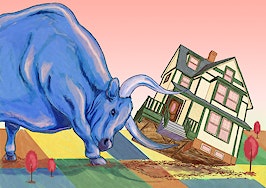On Sunday, HBO’s Last Week Tonight with John Oliver delved into the mobile home industry, otherwise known as the manufactured home or trailer industry, and outlined why the people who have invested in them are getting a pretty raw deal.
Oliver spent the segment calling out the private equity funds and other investors that have purchased the land where mobile homes sit, the inherent depreciation of the properties and the predatory loans that mobile home buyers take out—instead of mortgages.
“So the homes of some of the poorest people in America are getting snapped up by some of the richest people in America, and luckily, there’ve been no problems whatsoever,” Oliver said during the segment, before adding, “Except I’m obviously kidding. It’s going terribly.”
Of course, there’s a reason people buy mobile homes. An estimated 17.7 million people live in a mobile home, with a majority found in metro areas in the South or Southwest. It is more affordable than a traditional home and can be used to increase the availability of low-cost housing, but there are still extra fees even when the homes are owned by the people living in them. These include the cost of renting the lot in the mobile home park and supplying utilities for the property.
Mobile home owners have seen a huge increase in financial pressure from the rate hikes brought on by private equity investors like the Carlyle Group—worth $212 billion— who “have piled into the manufacturing housing sector in recent years,” according to a February report from the watchdog group, Private Equity Stakeholder Project.
New private equity owners “constantly change the rules and fines, just to make more money off of us,” one resident of a Kingsley Management community in Santa Ana said in that report. “If they want new stairs, you have to get new stairs on your home. If they don’t want our cars in the drive, they charge us extra fees. The ever changing requirements puts a lot of strain on residents. We feel harassed and stressed.”
Also in Oliver’s sights was one egregious example of a mobile home park owner: Frank Rolfe, co-owner of Mobile Home University. The late night host used multiple examples of phrases and quotes Rolfe uses to sell the idea of investing in mobile home parks. Including comparing the industry to a “Waffle House where the customers are chained to their booths,” highlighting that Americans continue to become poorer, and the fact that mobile park owners hold all the cards in the relationship with mobile home residents.
That’s because it costs an enormous amount of money to move a mobile home (a rough estimate is to budget $5-10 for every mile of moving distance). It also ends up being a risky venture as hiring a mover and obtaining permits could all be for nothing if your home is too old or needs repairs to move.
Say you just want to move out of a bad mobile home deal. That’s challenging because, like a car, the value of a mobile home depreciates and owners are left with high-interests loans as many obviously do not own the land underneath the building to qualify for residential mortgages.
To wrap up the segment, Oliver demonstrated how mobile home owners are banding together to purchase their park property when it ends up for sale. But they need support from organizations like ROC USA and mental health group Pathstone. Also needed is new legislation which offers mobile home owners the first right of refusal to purchase park property when its sold.












